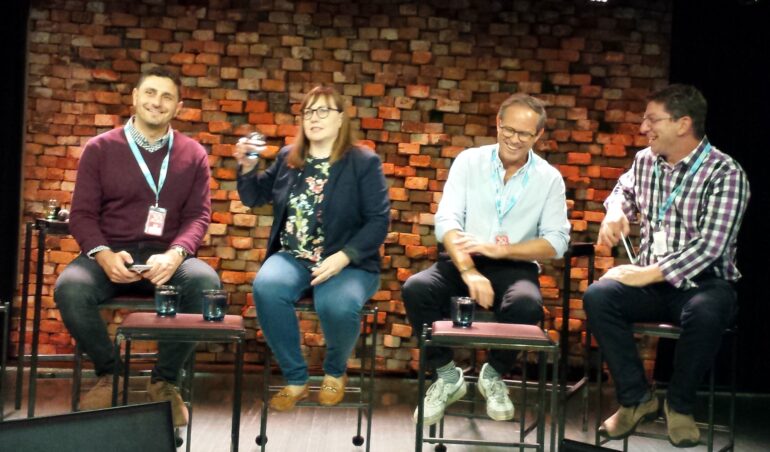WRITTEN BY: Annika Pham
Exclusive: International panellists gathered during the Finnish Film Affair in Helsinki shared their insight and tips on rights exploitation in the digital era.
Panellists gathered on September 21 in Helsinki were London-based Bobby Allen, SVP of Content at MUBI, L.A.-based Aram Tertzakian partner at XYZ Films and Adam Chapnick founder of Distribber.com, as well as Laura Kuulasmaa, business manager at Finland’s main SVOD platform Elisa Viihde. The discussion was moderated by prominent Hollywood writer, producer, distributor Adam Leipzig (Dead Poets Society, A Plastic Ocean, Honey I Shrunk the Kids).
Asked by Leipzig about their working practices and at what stage they usually commit to a project, Tertzakian said his company which handles around 10 films a film for worldwide distribution - half of them in-house productions - said he likes to get involved as early as possible on English language films when a script, director/writer names are in place, to then advise on the casting and help monetize the project as soon as possible.
With foreign language films, XYZ Films asks to view a rough cut, and based on attractive elements in place (director/script) they would follow through. Such was the case for instance with Baltasar Kormákur’s Icelandic film The Oath.
With the UK chiller shot in Farsi Under the Shadow by Babak Anvari (Bafta Outstanding Debut 2016), XYZ closed an SVOD deal with Netflix, ahead of the film’s screening at Sundance. Thanks to great reviews at the festival, the company then wrapped round rights outside Netflix, agreeing on a 90-day window for theatrical releases before the Netflix premiere.
Distribber is a self-distribution service for filmmakers/producers to keep control of their rights, and it serves as access point to all VOD and SVOD players. Chapnick gave the example of The Resurrection of Jack the Snake, a US documentary about wrestling. Distribber signed an exclusive on iTune and created a short feature for the platform. The film did well, according to Chapnick because it had a built-in audience and the creative/production team were very active in the marketing and community engagement.
Kuulasmaa said Elisa Viihde usually gets involved in Finnish feature films at script stage, signing LOC for projects submitted to Finnish Film Foundation support. The company also increasingly invests in original TV drama.
MUBI has grown from a worldwide streaming service/curator of arthouse films, into an all rights distributor, picking up around six films a year for US and UK/Ireland theatrical release. The next step for the company is to become equity investor in cherry-picked projects and expand theatrically in other territories. The company usually acquires quality arthouse films that have received critical acclaim at festivals -such as Juho Kuosmanen’s The Happiest Day in the Life of Olli Mäki - building a fully-fledged marketing campaign and distribution strategy for each title.
Key points on which panellists concurred are the following:
- Each film needs a tailor-made strategy. Marketing and knowing the audience is quintessential.
Chapnick said: “I tell producers and filmmakers who approach us: know your audience and do the marketing. That’s the way you get a career!"
Allen agrees: “People have to be realistic and know their audience. They need to decide what type of success they are looking for, be it a financial or critical-success, or simply walking on the red carpet.” - Theatrical is key for a film’s value across all platforms. “Theatrical helps build a film’s profile and value on the ancillary market. So it’s essential to negotiate a good window holdback and best cinema locations”, said Allen.
For the UK release of The Happiest Day in the Life of Olli Mäki, MUBI struck a 60-day window deal with the Curzon group which has its own SVOD platform and prestigious London venues. The film had a day and day release in cinemas and on Curzon SVOD platform, before premiering on MUBI’s own platform a month later. In the US the film had a 90-day window holdback and good visibility in landmark cinemas. “In the US cinema location matters a lot”, noted Leipzig. “You can have the right film in the wrong location and that can kill a film." - Know your windows and find the best platform for your film. In today’s changing market, there are no set rules; everything is up for negotiation.
- Get advice from professionals and trust them. “Surround yourself with people who know what you don’t know, be it in terms of sales, marketing, poster or trailer making”, said Tertzakian. “Local distributors know their market so trust them when or if they want to create their own campaign.”
- Looking ahead, all panellists were optimistic about the new distribution era.
Chapnick said: “It’s great for us to have new players coming in like Apple, or Facebook. With greater competition, the big players will take more risks and invest in all types of formats and content. They ARE the money!"
Allen believes that next to the big players, smaller OTT will also flourish, catering for niche audiences.
Kuulasmaa also expects competition to escalate on a global and local scale. “This [competition] has created a boom in drama and we start seeing a lack of writers and talents", she stressed.
In his closing speech, Tertzakian said: “contrary to those who see ‘doom and gloom’ for the indie world, I believe a golden age is coming. We won’t have the usual US majors dominating the market, but new OTT and Telco players. In any case, content will remain king and will create new opportunities for people to earn more and keep their eyeballs on film and TV shows.”
